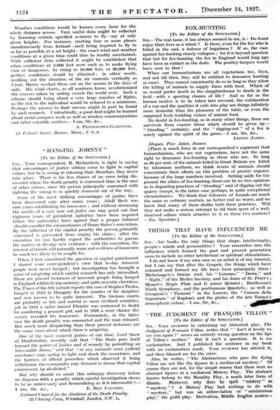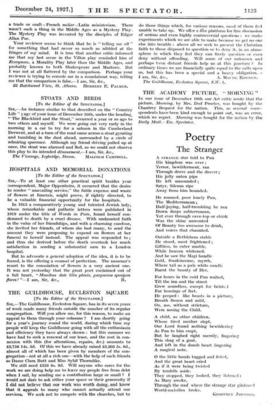"THE JUDGMENT OF FRANCOIS VILLON " [To the Editor of
the SPECTATOR.] Sin,—Your reviewer in criticizing my historical play, .The Judgment of Frani:cm' Villon, writes that " Isn't it lovely to see you again ? ' seems an entirely wrong question on the lips of Villon's mother." But it isn't a question. It is an exclamation. And I published the sentence in my book with an exclamation mark. Your reviewer has altered it, and then blamed me for the error.
Also, he writes, "The Abstractions who pass the dying Villon are not like the figures in a mediaeval mystery." Of course they are not, for the simple reason that there were no abstract figures in a mediaeval Mistery Play. The abstract figures belong to the Morality Play, a much later form of
drama. Moreover, why does he spell "mistery " as
" mystery " ? A Mistery Play had nothing to do with "mystery," but was an abbreviation of " ministerium play," the guild play. Derivation, Middle English mistere a trade or craft—French métier—Latin minislerium. There wasn't such a thing in the Middle Ages as a Mystery Play. The Mystery Play was invented by the disciples of Edgar Allan Poe.
Your reviewer seems to think that he is "telling me off" for something that had never so much as nibbled at the fringes of my mind". It is true that another critic informed me that my last scene in the Villon play reminded him of Everyman, a Morality Play later than the Middle Ages, and probably known to both Shakespeare and Marlowe. But I was not at all flattered by the comparison. Perhaps your reviewer is trying to console me in a roundabout way, telling me that the comparison is false.—I am, Sir, &c., 22 Batchwood View, St. Albans, HERBERT E. PALMER.































 Previous page
Previous page